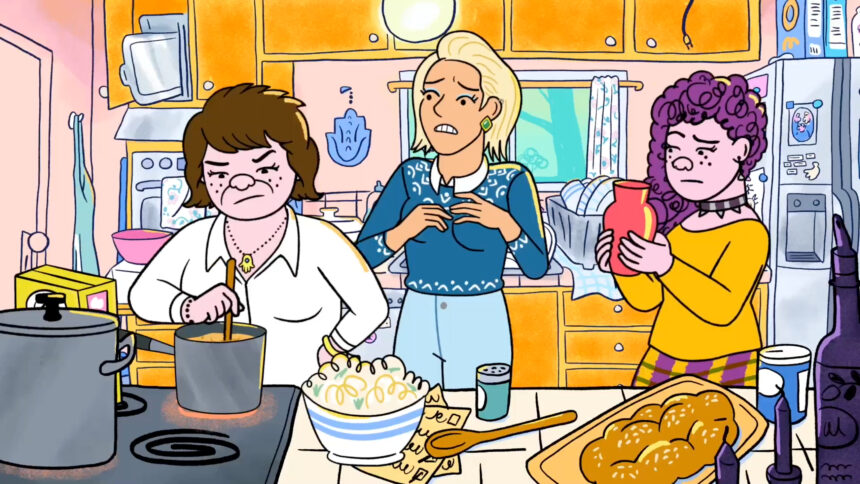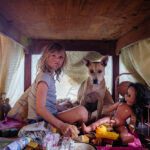Entertainment news Celebrity gossip Movie and TV show updates Latest celebrity news Trending entertainment stories
SPOILER ALERT: This article contains spoilers for Season 1 of “Long Story Short,” now streaming on Netflix.
The adult animated sitcom “Long Story Short” begins with a family grieving the loss of a matriarch. But because the show uses a non-linear structure that jumps around in time, it takes about half the 10-episode season before we realize the show is about the same family grieving another loved one. In the first scene, set in the 1990s, the Schwooper family — Naomi (Lisa Edelstein), Elliot (Paul Reiser), and their children Avi (Ben Feldman), Shira (Abbi Jacobson) and Yoshi (Max Greenfield) — drive home from Naomi’s mother’s funeral. In the 2020s, we learn that the adult Schwooper kids are now in mourning for Naomi herself, who died from COVID in the early days of the pandemic.
“I wanted it to feel like leafing through a family photo album,” says creator Raphael Bob-Waksberg, who returns to Netflix half a decade after his beloved Hollywood satire “BoJack Horseman” ended in early 2020. (Bob-Waksberg also executive produced “Tuca & Bertie,” which was created by his high school friend Lisa Hanawalt, a visual artist whose work partly inspired “BoJack.”) “Or when you remember something that makes you think of something else, which makes you think of something else, which makes you think of something else.”


Courtesy of Netflix
Bob-Waksberg says the show isn’t autobiographical, but “Long Story Short” draws on his upbringing as an observant Jew in the San Francisco Bay Area. Its world is much more realistic than that of “BoJack,” down to the devastating effect the pandemic had on so many families. Judaism, too, gets taken seriously in a way that makes “Long Story Short” stand out in a crowded field. A Yom Kippur episode, for example, is a far cry from Larry scrambling to get good synagogue seats on “Curb Your Enthusiasm.” It’s an earnest reckoning with what it means to atone for one’s sins, and the spiritual fulfillment that can come from doing so. Yoshi becomes Orthodox, and while the situation comes with many jokes — Naomi stages an intervention because she sees empty bottles of non-kosher wine her youngest son has poured out — his decision isn’t one of them.
“Long Story Short” doesn’t tackle every aspect of the American Jewish experience. After the last two years, the absence of Israel and its attendant debates is a conspicuous one. But in a conversation with Variety, Bob-Waksberg explains his choice to focus on “all the other things that being Jewish is,” as well as how the show was inspired by his own experience of parenthood and developing a new visual style in conjunction with Hanawalt.
How did this show become your next project after “Undone” at Prime Video and “Tuca & Bertie”?
I’ll tell you: all the other shows I pitched, nobody bought! So this is the one that someone bought. That’s my next show. I feel like that won’t look great in print.
But this one is special to me, and I’m glad that we’re making it. After “Tuca & Bertie” ended, I had no more business with Tornante, the company that I’ve made most of my shows with. And I like those guys, and I like Lisa, and I wanted an excuse to work with some of the people that I like again. So I started thinking about, “Do I have more animated ideas that I might want to do?” I have kids now, which I didn’t have the last time I made a TV show, and I was just thinking about family in a different way — thinking about family and identity and time, and the way those three broad concepts braid together like a challah. I guess that was the beginning of it.
I’m sure this is by design, but when I was watching the show it took me a few episodes to realize that this is a show about grief. What made you decide that a non-linear structure was the best way to approach that theme?
It’s about grief and it’s about memory. I think that often when somebody dies, it gives their life a different context. We think about them in different ways. And so I like the idea of an audience, once you get past the reveal, watching these episodes with the understanding that this is a person who would later be remembered, and that, in fact, you could view the series as a series of memories about this person and about these relationships. I wanted it to feel like leafing through a family photo album, or when you remember something that makes you think of something else, which makes you think of something else, which makes you think of something else. It’s not always chronological, the way you think about people, the way you think about your own family.


Courtesy of Netflix
I know just from reading about you that superficially, there are some parallels between the Schwooper family and your own upbringing. To what extent are you comfortable with this show being read as autobiographical?
I mean, I don’t love it, but also, I can’t control how people read it. People thought “BoJack” was autobiographical, so of course they’re gonna think this one is, because my life resembles this world much more closely. It’s not my job to tell people what to think about me or what it says about me. I also know that the vast majority of people who watch the show are not even going to know my name. Obviously, people who read this interview are going to be interested in me and what this says about me, but I didn’t make this show to talk about me. It’s its own thing, it’s its own world. It’s its own characters.
Popular on Variety
I went to a doctor recently for a routine checkup. It was a new doctor, and he was asking me what I do. And I say, “Well, I work in animation. I have a new show coming out. It’s coming to Netflix.” He goes, “Oh, I have Netflix, and I love adult animation. In fact, my favorite show is ‘BoJack Horseman’!” We were looking at my chart with my name on it, and he had no idea that I was the creator of “BoJack Horseman.” I felt like, “OK, that’s good.” I am not the main thing about this story. And so, yes, I think people who are interested in me or want to suppose stuff about my life based on the show might, but I think that’s much less interesting than thinking about the characters themselves and what the story is saying about them.
“BoJack Horseman” grew out of these drawings that Lisa does of anthropomorphic animals, and some qualities of the show’s universe came from there. When you’re building this show together, how did you two think about the visual world, since the characters are people-people this time?
We talked about making sure the show felt visually different from the other work we’ve done together, both “BoJack” and “Tuca & Bertie.” We didn’t want it to feel like BoJack himself could walk in at any moment. I think Lisa, even more so than I, really wanted that to be true. And because it is a more grounded world, we were looking for ways that it could feel a little more cartoon-y to cut against that, or hand-drawn. That was a big watchword for us: Make sure it feels like it was made by people, by hands — not by the straight line tool on the computer. So we wanted the lines to be a little wavy. We wanted the perspectives to be a little forced. We wanted the colors to be outside the lines a little bit.
A big thing for us was feeling like we both had experiences where we see these early designs — or in her case, she draws these early designs — that are full of life and energy. Then they kind of go through the cartoon character machine, and then they lose something. We wanted to help hold onto that kind of handcrafted feeling, and make the world feel like it incorporated the happy accidents of the artists.


Courtesy of Netflix
As surreal as the show can be, I found the way it approached COVID was incredibly granular and detailed. How did you want the pandemic to function in this narrative?
We have the benefit of hindsight now, and so we can be specific about it in ways that we couldn’t while it was happening, right? One of the hard things about it while it was happening was, you’d see all these shows that would try to address it, but you’d have to predict where we’re going to be in six months, because none of us had ever been through anything like this before. People [on screen] would be like, “Thank God that’s all over with!” Like, are you just creating a universe where that’s all over, or did you think by now it would be all over? And there were shows that just ignored it completely. I’m kind of grateful that I wasn’t working on a show at that time and had to make a choice, because I think either way, you have all these pitfalls.
I thought, “OK, now that we can look back a little bit, let’s be specific about it.” What were we doing in 2021, and 2022, and 2023? There wasn’t a hard line when it was over and everything was back to normal, and it was different person by person. We had a lot of conversations like, “Who would be wearing a mask in this scene? And for how long would they be wearing the mask?” Because also, we don’t want to put our characters in masks for the whole episode, because that’s annoying. I feel like we do take some liberties a little bit. I usually mask up a lot. For a long time, I would not be in rooms with people without a mask, more so than a lot of my friends. But we wanted to try to capture the feeling of what it was like in those years, and be as accurate as we could, obviously having the luxury of our elastic cartoon universe. It doesn’t have to be 100% factual, because it’s not a documentary. But if we make some attempts at it, people go, “Oh, for a cartoon, this is really realistic.”
Five years into this, it feels like we’re only now starting to get art that tries to wrap its arms around the entirety of what happened to us. This show and “Eddington” are obviously very different, but the fact that they came out so close together is — it’s in the air. Do you sense that as well?
Maybe. I mean, I hope so. I think my fear is that we just won’t talk about what happened. And maybe I’m overly paranoid in that way. My fear is it’s just like, we’re moving on. We’re memory-wiping it, and let’s focus on the next thing. And that scares me a little bit, because I feel like we’re all trying to collectively cover up this trauma. But maybe the way you put it is more correct — that we just need a little time to wrap our arms around it and think about how to talk about it. But I feel like there’s always new things to talk about, and so I worry that we won’t remember this time when thousands of people were dying every day.


Courtesy of Netflix
There are countless shows with Jewish themes out there — I’ll refrain from making the obvious joke about controlling the media — but “Long Story Short” stood out to me in how seriously it takes the spirituality of Judaism. (I cried at Kendra taking part in the Yom Kippur service.) What aspects of the religion did you want to emphasize?
It’s a weird thing, because we like to think of ourselves as pushing the bounds of stories that have never been told before — like, “This is a brand new, cutting edge thing!” — and then remember there have been so many shows about Jewish families. There, in fact, have been two very successful ones called “The Goldbergs.” We’re even repeating the names of families, because we’ve gone through so many unrelated Goldberg families!
But I did feel like a lot of the stories — not all of them, but a lot — told about Jews were either about secular, cultural New York Jews or super-ultra-Orthodox, Hasidic, black hat Jews. And there’s a lot of Jews between that. It felt like I could relate to pieces of both those kinds of stories. Rarely would I see a story that resonated with the way that I grew up, and what Judaism was for me, which was a religion. More than just a culture and a community and a history and everything else, it was a religion. I wanted to talk about Judaism as a religion. And what is difficult about that is, I feel like so much narrative about religion in our country, in our culture, is pushed through the Christian lens, which is that religion is about faith, and that is such a big part of what religion is. That was never really what religion was about for me or my family, or most of the Jews that I know. I wanted to tell a story about people who were religious, who observed religion, but it wasn’t about “God will get mad at me,” or “because I believe, I have faith.” That felt like a corner worth exploring and pushing the edges out of and depicting.
I was quite moved by the discussions of what it means to be Jewish, because in my experience, the last couple of years have been a very hard and contested time to be a Jew. There are so many internal disagreements in our community that come down to very fundamental, very emotional moral judgements. Your show doesn’t touch on geopolitics at all, and I have no idea the timeline on which you made it — but what was it like making this show while all those debates were happening?
I think the show, as you say, does have some of those conversations without necessarily using some of the key words that might make people not want to hear those conversations. And maybe that feels like a dodge. I don’t know. But I want this to be a show that people can watch together, and maybe it can spark some conversations of its own, or people can think about it in certain ways, without — [long pause] I’m gonna abandon that sentence. Can you ask that again?
I was just curious what it was like to make this show as all of this conversation was raging — knowing you’re about to enter into that discourse, even if you didn’t necessarily intend to when you started to make the show.
It felt nice. It felt nice to be able to talk about this stuff all day and to be with people who were either also Jewish or were interested in hearing about this stuff. I like that I can create a show that both celebrates and maybe interrogates a lot of the things contained within the idea of being Jewish without feeling — I mean, there’s a specific issue we’re talking around right now. We both know what it is. And I’m doing that deliberately, because I have found that when we talk about it, it takes all the air out of the room. It makes everything about that.
So I was glad to have a show that could not talk about that, and could be all the other things that being Jewish is, and didn’t feel like it had to address this elephant in the room right now. Or that because it was Jewish, it had to stake out an opinion on this, or it had to speak out about this in a certain way, or unpack this, or solve this. Because that is not the totality of what being Jewish is about, and I think that has overwhelmed a lot of the conversations around being Jewish the last couple of years.
This interview has been edited and condensed.








